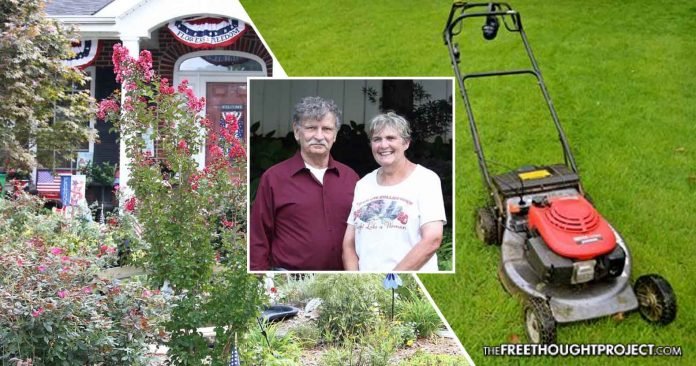
A couple in St. Peters, Missouri, learned the hard way that even though they are listed as the owners of their home, the city they live in still has the ability to dictate what is and is not on their property—even if they are allergic to it. Carl and Janice Duffner purchased their house in 2002, and they opted to plant a flower garden because Janice, 69, is allergic to turf grass.
Then in 2008, the city of St. Peters passed an ordinance stating that homeowners must plant at least 50 percent turf grass on their property.
The Duffners kept their garden and found themselves embroiled in a legal conflict when they were reported to the city in 2014. The City of St. Peters Board of Zoning Adjustment granted a variance that reduced the amount of turf grass required from 50 percent to 5 percent for the Duffners’ property.
In response, the Duffners filed a lawsuit arguing that the 5 percent requirement was still not right, based on the fact that Mrs. Duffner is still allergic. After their case was repeatedly returned to the lower court, the Duffners filed a federal lawsuit in December 2016.
The lawsuit stated that the Duffners believed the city ordinance is “unnecessary for the advancement of any compelling or permissible state objective” and that it “imposes a permanent obligation on the owner to cultivate and maintain that unwanted physical presence on their property for no reason other than that the government commands it.”
The Duffners’ neighbor, Mark Letko, told King5 News that the people in their neighborhood love the garden and enjoy visiting it. “All of our friends want to walk through it,” Letko said.
“I don’t know why anyone would want to take this pleasure away from her.”
Letko also said that he does not understand why the city is putting up such a big fight against the presence of the garden when it is not causing harm to anyone—however, the forced creation of turf grass in the yard would harm Mrs. Duffner.
“If it was there to harm people or something like that but it’s not that way,” Letko said. “St. Peter’s have just gone too far. It’s not drugs or anything like that. We are talking about grass.”
This week, U.S. District Judge John Ross issued a 17-page ruling, which stated that the Duffners can be forced to plant turf grass in their own yard.
He stated that the couple “failed to identify a fundamental right that is restricted by the Turf Grass Ordinance.”
The Duffners’ attorney, David Roland, said in a statement that he believes this case could set a dangerous precedent because it proves that the local government has the power to threaten a family with thousands of dollars in fines and decades in prison because they refuse to add something to their property that will cause them physical harm.
“The court’s ruling is bad for anyone who thinks they have a constitutional right to use their own private property in lawful, harmless ways, or to decide for themselves who and what they will allow on their private property. If the government can force the Duffners to plant grass instead of the flowers they prefer, there is nothing that would prevent a local government from forcing property owners—at their own expense!—to put in and maintain a fence or a swimming pool or holiday lights. And it is utterly absurd that the government can threaten its citizens with hundreds of thousands of dollars and twenty years in prison simply because they would rather have lawful, harmless flowers on their property rather than a plant that makes them sick.”
The next step in this case is to file an appeal with the Eighth Circuit Court of Appeals. Roland said he is committed to continuing to appeal the case, even if it takes them all the way to the Supreme Court.

We are the Free Thought Project — a hub for Free Thinking conversations about the promotion of liberty and the daunting task of government accountability. All of our content was created by our team of artists and writers. Learn more about us on our website thefreethoughtproject.com.
Their lawyer is incompetent.
The right the judge is refering to as not lusted is ex post facto protection.
If the garden existed before the law passed they are 'grandfathered in' by that provision in the law.
Every lawyer that signed it's name to that case needs to be disbarred.
The state was that child in school that bullied everyone, stole their lunch money, and told them what to do.
Go back farther, the state was the first group of strongmen to dominate their tribe via force, then they met up with other dominant leaders & bred sociopathic pit bulls for many many generations to get where we are today. Targeted Breeding works really well when you select for specific traits, by chance or design
awesome analogy!
yeah both great analogies
Nice post, thanks for sharing
Time for a new city council! Where I live there was a woman on the city council that thought she could dictate what color people could paint their houses... she only lasted until the next election.
What happened to ex post facto provisions of being 'grandfathered in'?
Their lawyer is incompetent and any lawyer that fails to respect that right should be disbarred.
It seems that ex post facto has become obsolete... I keep reading of instances where it is totally disregarded- like people never even heard of it!
Yep, the criminals in the bar arent trying to limit their power, and ignoring that provision expands them.
It is still valid, but if your lawyer doesnt raise the issue, you have waived its protections.
Just like your right to make them prove jurisdiction, most people give them a free pass by not raising the fact that nothing in the record supports their claim that they have it.
@marcstevens
Whole new meaning to 'turf wars'